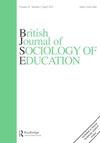Roma students’ academic self-assessment and educational aspirations in Hungarian primary schools
IF 2.1
3区 教育学
Q1 EDUCATION & EDUCATIONAL RESEARCH
引用次数: 1
Abstract
Abstract Using a unique database from Hungarian primary schools, this study investigates whether academic self-assessment and educational aspirations differ between Roma minority and non-Roma majority students with similar cognitive skills and abilities. I find that Roma students have lower self-assessment, on average, than their non-Roma classmates with similar competences. In addition, although there are no ethnic differences in educational aspirations two years before secondary school application, Roma students are less likely to actually apply to a secondary school track that provides the possibility to enter tertiary education. Roma students’ lower socioeconomic status can partly explain these differences. The analysis also shows that students’ self-assessment is more strongly related to teacher-given grades than to blind standardised test scores. The study highlights important mechanisms that can contribute to educational inequalities between minority and majority students.匈牙利小学罗姆学生的学业自我评估和教育愿望
本研究使用匈牙利小学的独特数据库,调查了具有相似认知技能和能力的罗姆少数民族和非罗姆多数学生的学术自我评估和教育愿望是否存在差异。我发现,罗姆学生的自我评估平均水平低于具有相似能力的非罗姆同学。此外,虽然在申请中学前两年的教育愿望上没有种族差异,但罗姆学生实际上不太可能申请提供进入高等教育可能性的中学课程。罗姆学生较低的社会经济地位可以部分解释这些差异。分析还表明,学生的自我评估与教师给出的分数的关系比与盲目的标准化考试分数的关系更强。该研究强调了可能导致少数族裔和多数族裔学生之间教育不平等的重要机制。
本文章由计算机程序翻译,如有差异,请以英文原文为准。
求助全文
约1分钟内获得全文
求助全文
来源期刊
CiteScore
3.70
自引率
9.50%
发文量
74
期刊介绍:
British Journal of Sociology of Education is one of the most renowned international scholarly journals in the field. The journal publishes high quality original, theoretically informed analyses of the relationship between education and society, and has an outstanding record of addressing major global debates about the social significance and impact of educational policy, provision, processes and practice in many countries around the world. The journal engages with a diverse range of contemporary and emergent social theories along with a wide range of methodological approaches. Articles investigate the discursive politics of education, social stratification and mobility, the social dimensions of all aspects of pedagogy and the curriculum, and the experiences of all those involved, from the most privileged to the most disadvantaged. The vitality of the journal is sustained by its commitment to offer independent, critical evaluations of the ways in which education interfaces with local, national, regional and global developments, contexts and agendas in all phases of formal and informal education. Contributions are expected to take into account the wide international readership of British Journal of Sociology of Education, and exhibit knowledge of previously published articles in the field. Submissions should be well located within sociological theory, and should not only be rigorous and reflexive methodologically, but also offer original insights to educational problems and or perspectives.

 求助内容:
求助内容: 应助结果提醒方式:
应助结果提醒方式:


